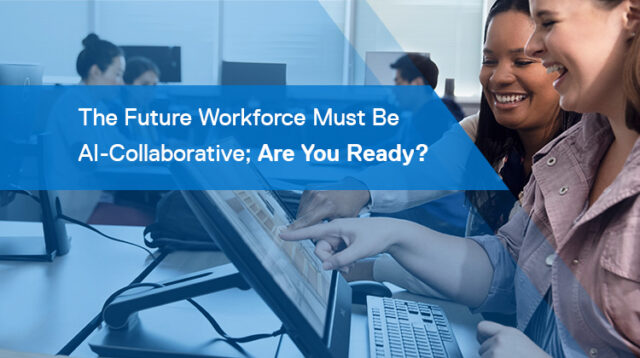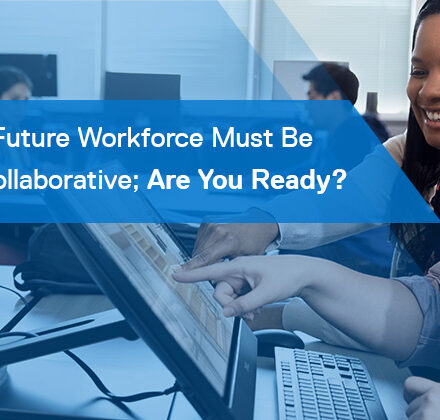The impact of Artificial Intelligence (AI) on the global workforce will continue at least through this decade.
- From 2016-2019 73% of jobs had their skills change entirely (Gartner)
- By 2030 AI will affect 85% of all jobs (Dell/IFTF)
- By 2030 AI will increase the global economy by $15.7T (PwC)
With figures such as those in our future, we need to understand the nature of AI and its impact on our workforces. This post will clarify our definitions of AI and related technologies, the several benefits and/or threats from AI, and (most importantly) its influence on employee roles, responsibilities and skill requirements.
What Does Artificial Intelligence (AI) Mean?
The MOOR Insights report for Dell Technologies states:
AI, which encompasses ML and deep learning (DL), is driving the capabilities of machines to imitate intelligent human behavior.
Artificial Intelligence is the umbrella term that refers to machine intelligence driven by machine learning (ML) and deep learning (DL) technologies. ML feeds large quantities of data into algorithms, allowing the machine to perform the task. DL applies algorithms for data crunching that teach machines to see and respond to patterns. Deep learning provides applications such as speech recognition, natural language processing, social network processing, autonomous driving, and financial market modeling.
Given these definitions, it is easy to understand that the goal of AI, expressed by Dell Technologies Education Services, is
…to implement human intelligence, create expert systems, and represent knowledge to solve complex real-world problems such as diagnosis of a medical condition, or communicating with humans in natural language.
What Are the Benefits of Artificial Intelligence (AI)?
- Economic benefits begin with the infusion of some $46b for AI project-funding in 2021. That is the first year of the projection that by 2030 AI will have increased the global economy by $13t and global GDP by 1.2% annually. By becoming smarter over time thanks to machine learning and deep learning, AI will benefit individual businesses. AI can affect companies’ bottom lines in a variety of ways; from helping people perform their tasks faster and with fewer errors to studying historical data to cut costs.
- Operational benefits from AI begin with its ability to perform 24×7, without any need for break time, and reach as far as industry-impacting data management that involves gathering and analyzing big data to improve efficiency and personalization. An operational application of AI is process automation – the performance of repetitive, mundane tasks such as data input and data transfer – which is faster than human processing. It’s long-known that AI can combine with other technologies to make and implement decisions faster. Have you ever played chess against a “chess engine”?
- Customer success benefits flow naturally from AI applications because nearly everything a customer does can be quantified as data. Machine learning focuses on the data of lead generation, potential purchases, buying habits, and much more. It analyzes the data to construct a picture of the individual customer and what will most likely interest them. Additionally, AI strengthens CRMs by collecting and retrieving data and increasing the integrity of that data to support a sales professionals’ performance.
- Company culture benefits occur in three distinct factors. First, workers being relieved of repetitive tasks that are scarcely challenging can begin to focus on more innovative, strategic, problem-solving assignments. For example, the IT professionals who no longer handle inventory or password resets, can explore and recommend technology advances to benefit the workplace. Second, the introduction of AI applications in a business opens its culture to acceptance of new ideas; employee engagement, customer involvement, product delivery, consultation-as-a-service. Third, actionizing AI applications promote the agile mindset within an organization as workers become more efficient and augmented by machine intelligence. As almost every AI application requires the test-and-learn approach to arrive at the desired functionality, companies that adopt the agile mindset invariably witness that development speeds up, teamwork improves, and fear of failure dissipates. AI can enhance those changes.
How Does Artificial Intelligence (AI) Impact Work and the Workforce?
Since John McCarthy coined the term Artificial Intelligence in 1950, the public has feared mass replacement of humans by computers. While there will be major changes to the work required and how that work is performed, the fear factor has been exaggerated.
While AI and automation certainly can and will replace some jobs, many overlook the fact that technology also creates new opportunities. Technology can help eliminate some of the more tedious tasks traditionally performed by humans, but advanced technologies still need humans to develop, maintain, improve, and operate them. (HR Daily Advisor, 2020)
The advantages that AI will provide result in 70% of business leaders welcoming people partnering with machines/robots to surpass our human limitations. Obviously, workers’ roles and responsibilities will change substantially because of AI. In 2017, the McKinsey Global Institute projected that 14% of the global workforce (375 million people) would either have to switch jobs or attain new skills, directly because of AI. That means AI fluency will be a critical set of skills.
AI fluency will include knowing how to leverage machine intelligence to manage workflows and accomplish tasks as well as knowing the limitations of the AI systems. And, the ability to know when a human is better suited to complete a task or set of activities will be a form of human fluency that machines will need to develop. Importantly, keeping pace with how each other’s evolving capabilities might be changing will be part of building fluency in AI. (Dell/IFTF, Future of Work)
As projected by Dell Technologies, new roles that will become prevalent in IT departments include:
- AI Specialist/Engineer
- Data Consultant
- Deep Learning Engineer
- Developer/Architects
- Machine Learning Specialist/Engineer
LinkedIn’s 2020 Emerging Jobs Report confirms that
Artificial Intelligence Specialists are the top emerging jobs in the US with a 74% growth. … AI and machine learning have both become synonymous with innovation, adding that their data shows “that’s more than just buzz”.
The LinkedIn report goes further in noting that between June 2019 and July 2020, job searches in the various AI roles increased by 106%.
 As AI technology becomes a staple of the workforce, it becomes an element of a worker’s daily practices. Adapting to AI requires upskilling or reskilling, both of which are major requirements for employers. Various sources indicate that AI responsibilities require unique skills in general categories. Humans must understand the functions of AI applications such as information and data processing. At the same time, humans are expected to apply the skills of reasoning, coordinating, and decision-making. Here is a list of the variety of skills that an AI professional needs:
As AI technology becomes a staple of the workforce, it becomes an element of a worker’s daily practices. Adapting to AI requires upskilling or reskilling, both of which are major requirements for employers. Various sources indicate that AI responsibilities require unique skills in general categories. Humans must understand the functions of AI applications such as information and data processing. At the same time, humans are expected to apply the skills of reasoning, coordinating, and decision-making. Here is a list of the variety of skills that an AI professional needs:
- Business Analysis Skills specific to AI
- Process reengineering
- Business case development
- DevOps and agile delivery
- Vendor selection and management
- Managerial Skills specific to AI
- Data literacy
- Governance
- Ethics
- AI architect skills
- Cognitive Skills relevant to AI
- Analytical thinking
- Innovation, creativity, originality, initiative
- Technology design and programming
- Critical thinking
Conclusion
The inevitable, favorable progress of Artificial Intelligence will produce global changes in the economy, business operations, customer success and company culture. The role of human workers will be increasingly complementary to that of AI; as often stated, a “human-machine partnership”. To achieve maximum benefits from all the changes, attention to workforce skills is critical. We must reskill people who will move to new roles and upskill those whose jobs require new, complex skills. Regarding both, we will provide opportunities for our workforce to become truly AI-fluent.
Get Ready With New Skills
Sources
- AI and the Workforce of the Future 2.0, Gartner
- The Next Era of Human/Machine Partnerships, Dell and IFTF
- Sizing the Prize: PwC’s Global Artificial Intelligence Study…. PwC
- Dell Technologies: Ready for Artificial Intelligence Leadership, Moor Insights & Strategy, 2018
- Upskilling Workers for the AI and Automation Age, HR Daily Advisor, 2020
- Automation and the future of work, Milken Institute Review/McKinsey Global Institute, 2018
- Future of Work: Forecasting Emerging Technologies’ Impact on Work in the Next Era of Human-Machine Partnerships, IFTF/Dell Technologies, 2018
- 2020 Emerging Jobs Report, LinkedIn, 2020
- Building a Roadmap for Effective Reskilling in the AI-Infused Workplace of Tomorrow, Dell Technologies, 2019


